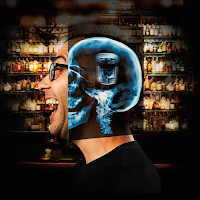Why Addiction Narratives Matter

By Katie Givens Kime Image courtesy of Merrimack Repertory Theatre . “My Higher Power is: Science !” proclaims Sean, a newly recovered alcoholic. “Sean” is the lead character in a comedic play, “ The White Chip ,” which premiered last year at Merrimac Repertory Theatre outside of Boston, Massachusetts. Written by Sean Daniels, the play dramatizes Daniels’ own near demise from alcoholism, and his experience of recovery. Neuroethics is writ large as the play tells the story of how critically important various addiction etiologies can be for those struggling with alcoholism, or addiction of any sort. In Sean’s case, the etiology is the brain disease model of addiction (BDMA) in a notable combination with the “Higher Power” understanding of 12-step programs, which he credits with saving his life. Behind the curious twists of the play, questions linger: which model of addiction should be presented to those in recovery, when so much conflict exists amongst addiction researchers, clinici...

